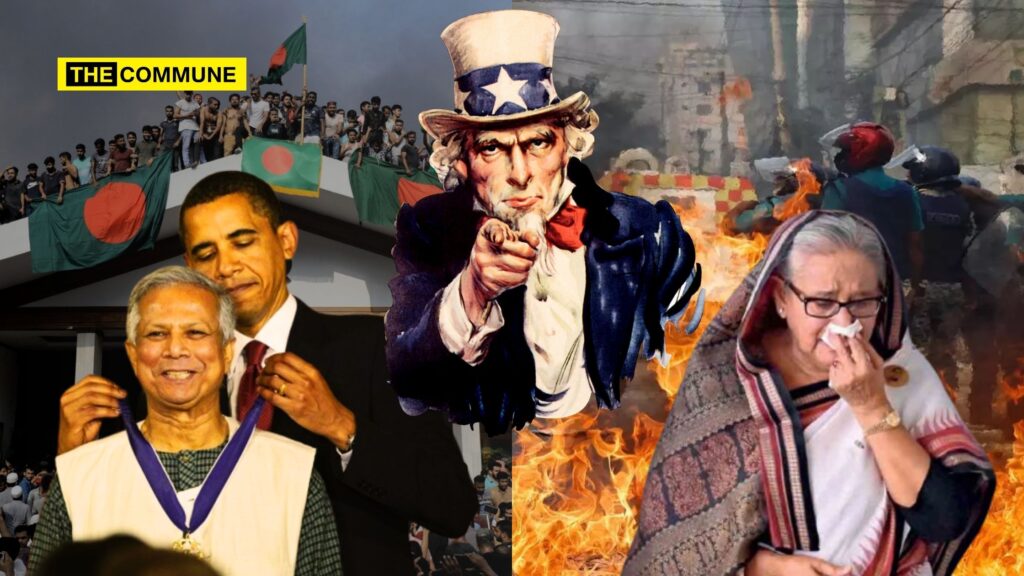Recent documents obtained by The Sunday Guardian provide a comprehensive look into a US-backed initiative to orchestrate regime change in Bangladesh. The details of the program, which began in early 2019, expose a concerted effort by American officials and organizations to influence political dynamics in Dhaka and challenge Prime Minister Sheikh Hasina’s leadership. This initiative, executed primarily by the International Republican Institute (IRI), was funded through grants from the National Endowment for Democracy (NED) and the U.S. Agency for International Development (USAID).
Background And Objectives
The program, named “Promoting Accountability, Inclusivity, and Resiliency Support Program” (PAIRS), was a strategic effort designed to counteract what was perceived as India’s undue influence in Bangladeshi politics. According to internal documents, the initiative was part of a broader agenda to support democratic institutions and political reforms in countries with significant geopolitical interests to the U.S.
The IRI, one of the four core institutes of NED along with the National Democratic Institute (NDI), the Center for International Private Enterprise (CIPE), and the Solidarity Center, received its mandate from both NED and USAID to implement this program. The IRI’s role was to promote democracy by supporting democratic institutions, political parties, civil society, and electoral processes. This mission aligns with the IRI’s stated objectives of fostering democratic governance through various forms of engagement and support.
Implementation And Activities
The PAIRS program was launched with a grant from USAID and NED and ran for 22 months, concluding in January 2021. The program was designed to enhance political participation and amplify anti-authoritarian voices in Bangladesh. It included a range of activities aimed at achieving these goals:
- Advocacy Grants and Art Projects: The IRI issued 11 advocacy grants to artists, musicians, and organizations that produced 225 art projects addressing political and social issues. These projects were viewed nearly 400,000 times, helping to spread the program’s messages.
- Support for Civil Society Organizations: The program supported three civil society organizations (CSOs) representing LGBTI, Bihari, and ethnic communities. These organizations trained 77 activists and engaged 326 citizens to develop 43 specific policy demands proposed to 65 government officials.
- Research and Surveys: The IRI conducted quantitative and qualitative research, including three focus group reports and the largest published survey of LGBTI people in Bangladesh.
The documents also highlight that the program was designed to operate within the constraints of Bangladesh’s restrictive political environment, especially concerning the Digital Security Act (DSA) enacted in 2018. This act has been criticized for curbing social media freedom and enabling the government to imprison political opponents, journalists, and activists.
Impact And Findings
Despite the IRI’s efforts, recent reports by the National Democratic Institute (NDI) reflect a mixed outcome. According to the NDI’s report on the 2024 national elections, the period leading up to and including the election day saw less physical and online violence compared to previous cycles. However, the report also noted significant issues, such as increased political polarization, violence among political actors, and a contraction in civic space.
The IRI’s own assessment acknowledged that the COVID-19 pandemic could destabilize the Hasina government but observed that low death rates and economic recovery mitigated this risk. The evaluation also highlighted that while the Awami League’s power remained strong, the Bangladesh Nationalist Party (BNP) was seen as a potential future challenger.
Counteracting India’s Influence
The documents reveal that a key objective of the PAIRS program was to counterbalance India’s perceived influence in Bangladesh. The initiative aimed to address what was seen as the negative impact of India’s support for the Awami League, which was believed to have led to increased hegemony and corruption within Bangladeshi politics. The IRI’s efforts were framed within the context of countering regional powers like India and involved activities to weaken the Awami League’s grip on power.
The focus on India highlights a broader strategic interest in reshaping political dynamics in South Asia. By framing India’s support for the Awami League as problematic, the program reflects a strategic approach to influencing Bangladeshi politics and potentially affecting U.S.-India diplomatic relations.
US Officials Involved
Key American officials involved in overseeing the PAIRS program included Chris Murphy, Sumona Guha, Donald Lu, Sarah Margon, and Francisco Bencosme. These individuals played significant roles in shaping and implementing the initiative:
- Chris Murphy (D-CT): A senior member of the Senate Foreign Relations Committee with oversight on South Asia.
- Sumona Guha: South Asia Director at the National Security Council.
- Donald Lu: Incoming Assistant Secretary for South and Central Asia at the State Department.
- Sarah Margon: Incoming Assistant Secretary for Democracy, Human Rights, and Labor at the State Department.
- Francisco Bencosme: Senior Advisor for East Asian and Pacific Affairs at the State Department, previously at Amnesty International.
These officials were crucial in guiding the program’s execution and ensuring alignment with U.S. foreign policy objectives.
The revelations about the PAIRS program and the broader involvement of U.S. agencies in Bangladesh’s political landscape raise important questions about the role of external actors in shaping national politics. The initiative’s focus on countering perceived foreign influence and promoting democratic reforms highlights the complexities of international engagement in domestic political affairs.
The documents suggest that while the IRI and its partners aimed to support democratic processes, their activities also intersected with broader geopolitical strategies, including counterbalancing regional powers like India.
Subscribe to our Telegram, WhatsApp, and Instagram channels and get the day’s best stories delivered to you personally.

